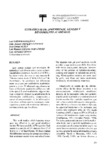Estrategias de aprendizaje, género y rendimiento académico

Ver/
Use este enlace para citar
http://hdl.handle.net/2183/6894Coleccións
Metadatos
Mostrar o rexistro completo do ítemTítulo
Estrategias de aprendizaje, género y rendimiento académicoAutor(es)
Data
2001Cita bibliográfica
Revista galego-portuguesa de psicoloxía e educación, 2001, 7: 203-216 ISSN: 1138-1663
Resumo
[Resumen] Este trabajo estudia qué estrategias de aprendizaje son eficaces para obtener un buen rendimiento académico. Se utilizó el ACRA y las notas finales de curso en una muestra de 254 estudiantes desde 20 de la E.S.O. a 10 de Bachillerato. Se estudiaron las diferencias entre los grupos por rendimiento académico, género y curso. El alumnado que alcanza un buen rendimiento académico utiliza con más éxito que el de mal rendimiento, algunas tácticas propias del proceso de adquisición de la información, codificación, recuperación y apoyo al procesamiento de la información. Las chicas utilizan más las estrategias metacognitivas y están más motivadas intrínseca y extrínsecamente que los chicos. [Abstract] This work studies which 1eaming strategies are effective to get good academic results. We have used the ACRA and the final marks in a samp1e of 254 students from 20 of E.S.O. to 10 of Bachillerato. We have studied the differences among the groups according to heir academic results, sexes and school years. The students who get good academic results are able to use, more successfully than those with worse results,some strategies characteristic of the process of information coding, retaking and support to information processing. Metacognitive strateies are more used by gir1s, and these are more motivated, intrinscally nd extrinsically, than boys
ISSN
1138-1663





